- Home
- Roald Dahl
Switch Bitch Page 9
Switch Bitch Read online
Page 9
The policemen paused, and the woman, watching him, felt as though her whole body were shrinking and shrinking and shrinking inside its skin.
'... that your husband was involved in an accident on the Hudson River Parkway at approximately five forty-five this evening, and died in the ambulance...'
The policeman who was speaking produced the crocodile wallet she had given Ed on their twentieth wedding anniversary, two years back, and as she reached out to take it, she found herself wondering whether it might not still be warm from having been close to her husband's chest only a short while ago.
'If there's anything we can do,' the policeman was saying, 'like calling up somebody to come over... some friend or relative maybe...'
Anna heard his voice drifting away, then fading out altogether, and it must have been about then that she began to scream. Soon she became hysterical, and the two policemen had their hands full trying to control her until the doctor arrived some forty minutes later and injected something into her arm.
She was no better, though, when she woke up the following morning. Neither her doctor nor her children were able to reason with her in any way at all, and had she not been kept under almost constant sedation for the next few days, she would undoubtedly have taken her own life. In the brief lucid periods between drug-takings, she acted as though she were demented, calling out her husband's name and telling him that she was coming to join him as soon as she possibly could. It was terrible to listen to her. But in defence of her behaviour, it should be said at once that this was no ordinary husband she had lost.
Anna Greenwood had married Ed Cooper when they were both eighteen, and over the time they were together, they grew to be closer and more dependent upon each other than it is possible to describe in words. Every year that went by, their love became more intense and overwhelming, and toward the end, it had reached such a ridiculous peak that it was almost impossible for them to endure the daily separation caused by Ed's departure for the office in the mornings. When he returned at night he would rush through the house to seek her out, and she, who had heard the noise of the front door slamming, would drop everything and rush simultaneously in his direction, meeting him head on, recklessly, at full speed, perhaps halfway up the stairs, or on the landing, or between the kitchen and the hall; and as they came together, he would take her in his arms and hug her and kiss her for minutes on end as though she were yesterday's bride. It was wonderful. It was so utterly unbelievably wonderful that one is very nearly able to understand why she should have had no desire and no heart to continue living in a world where her husband did not exist any more.
Her three children, Angela (twenty), Mary (nineteen) and Billy (seventeen and a half), stayed around her constantly right from the start of the catastrophe. They adored their mother, and they certainly had no intention of letting her commit suicide if they could help it. They worked hard and with loving desperation to convince her that life could still be worth living, and it was due entirely to them that she managed in the end to come out of the nightmare and climb back slowly into the ordinary world.
Four months after the disaster, she was pronounced 'moderately safe' by the doctors, and she was able to return, albeit rather listlessly, to the old routine of running the house and doing the shopping and cooking the meals for her grown-up children.
But then what happened?
Before the snows of that winter had melted away, Angela married a young man from Rhode Island and went off to live in the suburbs of Providence.
A few months later, Mary married a fair-haired giant from a town called Slayton, in Minnesota, and away she flew for ever and ever and ever. And although Anna's heart was now beginning to break all over again into tiny pieces, she was proud to think that neither of the two girls had the slightest inkling of what was happening to her. ('Oh, Mummy, isn't it wonderful!' 'Yes, my darling, I think it's the most beautiful wedding there's ever been! I'm even more excited than you are!' etc. etc.)
And then, to put the lid on everything, her beloved Billy, who had just turned eighteen, went off to begin his first year at Yale.
So all at once, Anna found herself living in a completely empty house.
It is an awful feeling, after twenty-three years of boisterous, busy, magical family life, to come down alone to breakfast in the mornings, to sit there in silence with a cup of coffee and a piece of toast, and to wonder what you are going to do with the day that lies ahead. The room you are sitting in, which has heard so much laughter, and seen so many birthdays, so many Christmas trees, so many presents being opened, is quiet now and feels curiously cold. The air is heated and the temperature itself is normal, but the place still makes you shiver. The clock has stopped because you were never the one who wound it in the first place. A chair stands crooked on its legs, and you sit staring at it, wondering why you hadn't noticed it before. And when you glance up again, you have a sudden panicky feeling that all the four walls of the room have begun creeping in upon you very very slowly when you weren't looking.
In the beginning, she would carry her coffee cup over to the telephone and start calling up friends. But all her friends had husbands and children, and although they were always as nice and warm and cheerful as they could possibly be, they simply could not spare the time to sit and chat with a desolate lady from across the way first thing in the morning. So then she started calling up her married daughters instead.
They, also, were sweet and kind to her at all times, but Anna detected, very soon, a subtle change in their attitudes toward her. She was no longer number one in their lives. They had husbands now, and were concentrating everything upon them. Gently but firmly, they were moving their mother into the background. It was quite a shock. But she knew they were right. They were absolutely right. She was no longer entitled to impinge upon their lives or to make them feel guilty for neglecting her.
She saw Dr Jacobs regularly, but he wasn't really any help. He tried to get her to talk and she did her best, and sometimes he made little speeches to her full of oblique remarks about sex and sublimation. Anna never properly understood what he was driving at, but the burden of his song appeared to be that she should get herself another man.
She took to wandering around the house and fingering things that used to belong to Ed. She would pick up one of his shoes and put her hand into it and feel the little dents that the ball of his foot and his toes had made upon the sole. She found a sock with a hole in it, and the pleasure it gave her to darn that sock was indescribable. Occasionally, she took out a shirt, a tie, and a suit, and laid them on the bed, all ready for him to wear, and once, one rainy Sunday morning, she made an Irish stew...
It was hopeless to go on.
So how many pills would she need to make absolutely sure of it this time? She went upstairs to her secret store and counted them. There were only nine. Was that enough? She doubted that it was. Oh, hell. The one thing she was not prepared to face all over again was failure - the rush to the hospital, the stomach-pump, the seventh floor of the Payne Whitney Pavilion, the psychiatrists, the humiliation, the misery of it all...
In that case, it would have to be the razor-blade. But the trouble with the razor-blade was that it had to be done properly. Many people failed miserably when they tried to use the razor-blade on the wrist. In fact, nearly all of them failed. They didn't cut deep enough. There was a big artery down there somewhere that simply had to be reached. Veins were no good. Veins made plenty of mess, but they never quite managed to do the trick. Then again, the razor-blade was not an easy thing to hold, not if one had to make a firm incision, pressing it right home all the way, deep deep down. But she wouldn't fail. The ones who failed were the ones who actually wanted to fail. She wanted to succeed.
She went to the cupboard in the bathroom, searching for blades. There weren't any. Ed's razor was still there, and so was hers. But there was no blade in either of them, and no little packet lying alongside. That was understandable. Such things had been removed from the house on an earlier occasio
n. But there was no problem. Anyone could buy a packet of razor-blades.
She returned to the kitchen and took the calendar down from the wall. She chose September 23rd, which was Ed's birthday, and wrote r-b (for razor-blades) against the date. She did this on September 9th, which gave her exactly two weeks' grace to put her affairs in order. There was much to be done old bills to be paid, a new will to be written, the house to be tidied up, Billy's college fees to be taken care of for the next four years, letters to the children, to her own parents, to Ed's mother, and so on and so forth.
Yet, busy as she was, she found that those two weeks, those fourteen long days, were going far too slowly for her liking. She wanted to use the blade, and eagerly every morning she counted the days that were left. She was like a child counting the days before Christmas. For wherever it was that Ed Cooper had gone when he died, even if it were only to the grave, she was impatient to join him.
It was in the middle of this two-week period that her friend Elizabeth Paoletti came calling on her at eight thirty one morning. Anna was making coffee in the kitchen at the time, and she jumped when the bell rang and jumped again when it gave a second long blast.
Liz came sweeping in through the front door, talking nonstop as usual. 'Anna, my darling woman, I need your help! Everyone's down with flu at the office. You've got to come! Don't argue with me! I know you can type and I know you haven't got a damn thing in the world to do all day except mope. Just grab your hat and purse and let's get going. Hurry up, girl, hurry up! I'm late as it is!'
Anna said, 'Go away, Liz. Leave me alone.'
'The cab is waiting,' Liz said.
'Please,' Anna said, 'don't try to bully me now. I'm not coming.'
'You are coming,' Liz said. 'Pull yourself together. Your days of glorious martyrdom are over.'
Anna continued to resist, but Liz wore her down, and in the end she agreed to go along just for a few hours.
Elizabeth Paoletti was in charge of an adoption society, one of the best in the city. Nine of the staff were down with flu. Only two were left, excluding herself. 'You don't know a thing about the work,' she said in the cab, 'but you're just going to have to help us all you can...'
The office was bedlam. The telephones alone nearly drove Anna mad. She kept running from one cubicle to the next, taking messages that she did not understand. And there were girls in the waiting room, young girls with ashen stony faces, and it became part of her duty to type their answers on an official form.
'The father's name?'
'Don't know.'
'You've no idea?'
'What's the father's name got to do with it?'
'My dear, if the father is known, then his consent has to be obtained as well as yours before the child can be offered for adoption.'
'You're quite sure about that?'
'Jesus, I told you, didn't I?'
At lunchtime, somebody brought her a sandwich, but there was no time to eat it. At nine o'clock that night, exhausted and famished and considerably shaken by some of the knowledge she had acquired, Anna staggered home, took a stiff drink, fried up some eggs and bacon, and went to bed.
'I'll call for you at eight o'clock tomorrow morning,' Liz had said. 'And for God's sake be ready.' Anna was ready. And from then on she was hooked.
It was as simple as that.
All she'd needed right from the beginning was a good hard job of work to do, and plenty of problems to solve - other people's problems instead of her own.
The work was arduous and often quite shattering emotionally, but Anna was absorbed by every moment of it, and within about - we are skipping right forward now - within about a year and half, she began to feel moderately happy once again. She was finding it more and more difficult to picture her husband vividly, to see him precisely as he was when he ran up the stairs to meet her, or when he sat across from her at supper in the evenings. The exact sound of his voice was becoming less easy to recall, and even the face itself, unless she glanced at a photograph, was no longer sharply etched in the memory. She still thought about him constantly, but she discovered that she could do so now without bursting into tears, and when she looked back on the way she had behaved a while ago, she felt slightly embarrassed. She started taking a mild interest in her clothes and in her hair, she returned to using lipstick and to shaving the hair from her legs. She enjoyed her food, and when people smiled at her, she smiled right back at them and meant it. In other words, she was back in the swim once again. She was pleased to be alive.
It was at this point that Anna had to go down to Dallas on office business.
Liz's office did not normally operate beyond state lines, but in this instance, a couple who had adopted a baby through the agency had subsequently moved away from New York and gone to live in Texas. Now, five months after the move, the wife had written to say that she no longer wanted to keep the child. Her husband, she announced, had died of a heart attack soon after they'd arrived in Texas. She herself had remarried almost at once, and her new husband 'found it impossible to adjust to an adopted baby...'
Now this was a serious situation, and quite apart from the welfare of the child itself, there were all manner of legal obligations involved.
Anna flew down to Dallas in a plane that left New York very early, and she arrived before breakfast. After checking in at her hotel, she spent the next eight hours with the persons concerned in the affair, and by the time she had done all that could be done that day, it was around four thirty in the afternoon and she was utterly exhausted. She took a cab back to the hotel, and went up to her room. She called Liz on the phone to report the situation, then she undressed and soaked herself for a long time in a warm bath. Afterwards, she wrapped up in a towel and lay on the bed, smoking a cigarette.
Her efforts on behalf of the child had so far come to nothing. There had been two lawyers there who had treated her with absolute contempt. How she hated them. She detested their arrogance and their softly spoken hints that nothing she might do would make the slightest difference to their client. One of them kept his feet up on the table all the way through the discussion, and both of them had rolls of fat on their bellies, and the fat spilled out into their shirts like liquid and hung in huge folds over their belted trouser-tops.
Anna had visited Texas many times before in her life, but until now she had never gone there alone. Her visits had always been with Ed, keeping him company on business trips; and during those trips, he and she had often spoken about the Texans in general and about how difficult it was to like them. One could ignore their coarseness and their vulgarity. It wasn't that. But there was, it seemed, a quality of ruthlessness still surviving among these people, something quite brutal, harsh, inexorable, that it was impossible to forgive. They had no bowels of compassion, no pity, no tenderness. The only so-called virtue they possessed - and this they paraded ostentatiously and endlessly to strangers - was a kind of professional benevolence. It was plastered all over them. Their voices, their smiles, were rich and syrupy with it. But it left Anna cold. It left her quite, quite cold inside.
'Why do they love acting so tough?' she used to ask.
'Because they're children,' Ed would answer. 'They're dangerous children who go about trying to imitate their grandfathers. Their grandfathers were pioneers. These people aren't.'
It seemed that they lived, these present-day Texans, by a sort of egotistic will, push and be pushed. Everybody was pushing. Everybody was being pushed. And it was all very fine for a stranger in their midst to step aside and announce firmly, 'I will not push, and I will not be pushed.' That was impossible. It was especially impossible in Dallas. Of all the cities in the state, Dallas was the one that had always disturbed Anna the most. It was such a godless city, she thought, such a rapacious, gripped, iron, godless city. It was a place that had run amok with its money, and no amount of gloss and phony culture and syrupy talk could hide the fact that the great golden fruit was rotten inside.
Anna lay on the bed with her bath towel
around her. She was alone in Dallas this time. There was no Ed with her now to envelope her in his incredible strength and love; and perhaps it was because of this that she began, all of a sudden, to feel slightly uneasy. She lit a second cigarette and waited for the uneasiness to pass. It didn't pass; it got worse. A hard little knot of fear was gathering itself in the top of her stomach, and there it stayed, growing bigger every minute. It was an unpleasant feeling, the kind one might experience if one were alone in the house at night and heard, or thought one heard, a footstep in the next room.
In this place there were a million footsteps, and she could hear them all.
She got off the bed and went over to the window, still wrapped in her towel. Her room was on the twenty-second floor, and the window was open. The great city lay pale and milky-yellow in the evening sunshine. The street below was solid with automobiles. The sidewalk was filled with people. Everybody was hustling home from work, pushing and being pushed. She felt the need of a friend. She wanted very badly to have someone to talk to at this moment. She would have liked a house to go to, a house with a family - a wife and husband and children and rooms full of toys, and the husband and wife would fling their arms around her at the front door and cry out, 'Anna! How marvellous to see you! How long can you stay? A week, a month, a year?'
All of a sudden, as so often happens in situations like this, her memory went click, and she said aloud, 'Conrad Kreuger! Good heavens above! He lives in Dallas... at least he used to...'
She hadn't seen Conrad since they were classmates in high school, in New York. They were both about seventeen then, and Conrad had been her beau, her love, her everything. For over a year they had gone around together, and each of them had sworn eternal loyalty to the other, with marriage in the near future. Then suddenly Ed Cooper had flashed into her life, and that, of course, had been the end of the romance with Conrad. But Conrad did not seem to have taken the break too badly. It certainly couldn't have shattered him, because not more than a month or two later he had started going strong with another girl in the class...
Now what was her name?

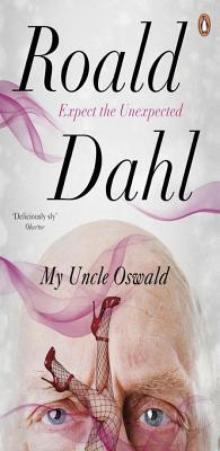 My Uncle Oswald
My Uncle Oswald The Best of Roald Dahl
The Best of Roald Dahl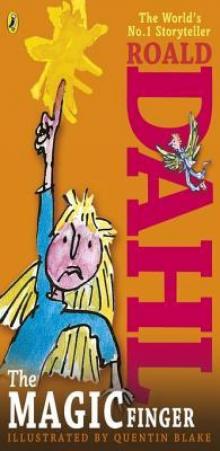 The Magic Finger
The Magic Finger Charlie and the Chocolate Factory
Charlie and the Chocolate Factory Fantastic Mr Fox
Fantastic Mr Fox Matilda
Matilda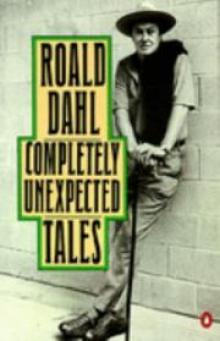 Completely Unexpected Tales: Tales of the Unexpected. More Tales of the Unexpected
Completely Unexpected Tales: Tales of the Unexpected. More Tales of the Unexpected The Wonderful Story of Henry Sugar and Six More
The Wonderful Story of Henry Sugar and Six More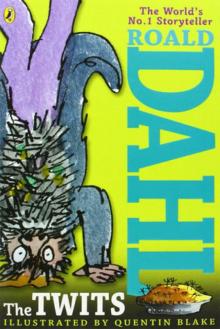 The Twits
The Twits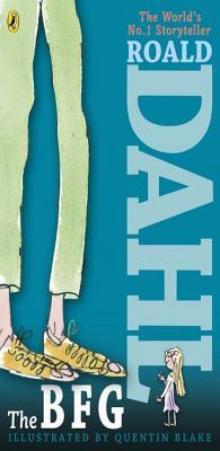 The BFG
The BFG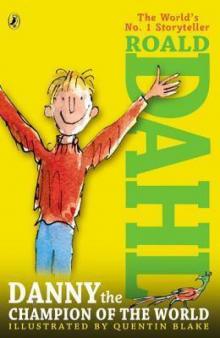 Danny the Champion of the World
Danny the Champion of the World The Witches
The Witches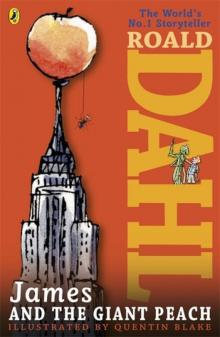 James and the Giant Peach
James and the Giant Peach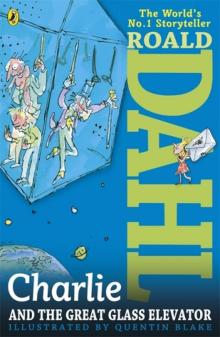 Charlie and the Great Glass Elevator
Charlie and the Great Glass Elevator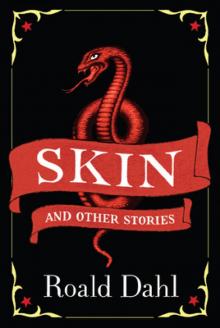 Skin and Other Stories
Skin and Other Stories Kiss Kiss
Kiss Kiss Switch Bitch
Switch Bitch The Giraffe and the Pelly and Me
The Giraffe and the Pelly and Me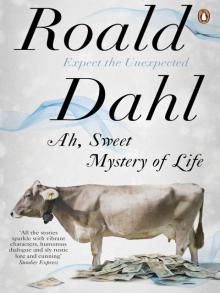 Ah, Sweet Mystery of Life
Ah, Sweet Mystery of Life Fear
Fear The Great Automatic Grammatizator and Other Stories
The Great Automatic Grammatizator and Other Stories Someone Like You
Someone Like You Charlie and the Great Glass Elevator c-2
Charlie and the Great Glass Elevator c-2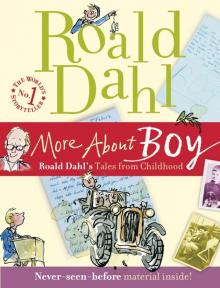 More About Boy
More About Boy Tales of the Unexpected
Tales of the Unexpected The Umbrella Man and Other Stories
The Umbrella Man and Other Stories Dirty Beasts
Dirty Beasts Roald Dahl's Mischief and Mayhem
Roald Dahl's Mischief and Mayhem The Collected Short Stories of Roald Dahl, Volume 1
The Collected Short Stories of Roald Dahl, Volume 1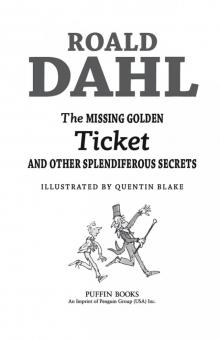 The Missing Golden Ticket and Other Splendiferous Secrets
The Missing Golden Ticket and Other Splendiferous Secrets Billy and the Minpins
Billy and the Minpins Over to You
Over to You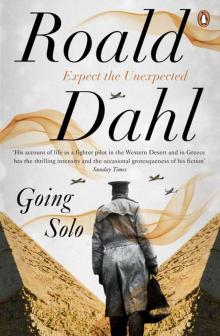 Going Solo
Going Solo Deception
Deception War
War Man from the South ee-3
Man from the South ee-3 More Tales of the Unexpected
More Tales of the Unexpected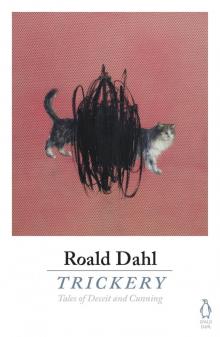 Trickery
Trickery Rhyme Stew
Rhyme Stew Charlie and the Chocolate Factory (Puffin Modern Classics relaunch)
Charlie and the Chocolate Factory (Puffin Modern Classics relaunch)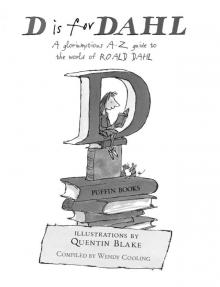 D is for Dahl
D is for Dahl Roald Dahl Whoppsy-Whiffling Joke Book
Roald Dahl Whoppsy-Whiffling Joke Book Spotty Powder and other Splendiferous Secrets
Spotty Powder and other Splendiferous Secrets Charlie and the Chocolate Factory c-1
Charlie and the Chocolate Factory c-1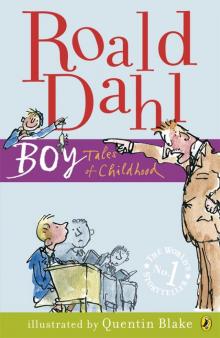 Boy
Boy Completely Unexpected Tales
Completely Unexpected Tales Madness
Madness Innocence
Innocence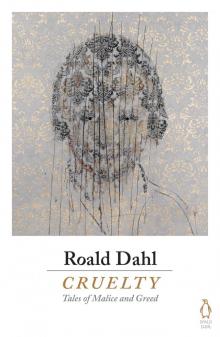 Cruelty
Cruelty George's Marvellous Medicine
George's Marvellous Medicine